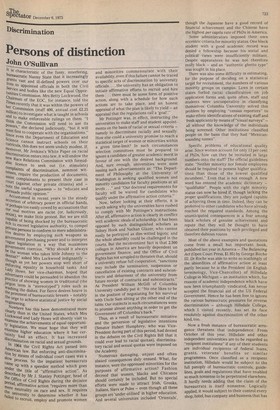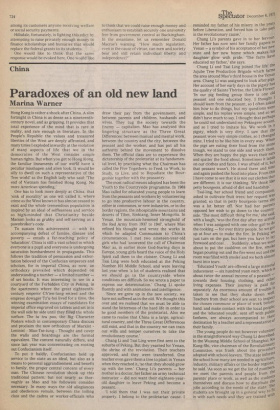D iscrimination
Persons of distinction
John O'Sullivan
It is characteristic of the fussy, interfering, bureaucratic Nanny State that it increasingly grants vast and ill-defined powers over our
lives to appointed officials in both the Civil Service and bodies like the new Equal Oppor tunities Commission. Mrs Betty Lockwood, the Chairman of the EOC, for instance, told the
Times recently that it was within the powers of her r
—ommission (staff 400, annual cost £2.25 million) to investigate what is taught in schools and to make enforceable rulings on them. "I Mink the Commission will need to use its
Powers," she declared judiciously, "but it will Want first to cooperate with the organisations."
Since even the Department of Education and Science cannot instruct schools on their curricula, this does not seem unduly modest. If,
moreover, Mr Jenkins's White Paper on racial discrimination enters into taw, it will endow the new Race Relations Commission with formidable licence to seek out (i.e. stimulate) c°mPlaints of discrimination, summon witnesses, require the production of documents, assist complainants to present their case in , court (against other private citizens) and —
' note the useful vagueness — to "educate and Persuade public opinion."
Accustomed in recent years to the steady accretion of arbitrary power in official hands, or Perhaps too easily cowed by accusations that our real motives are racist (or, ludicrously, sexist), we make little protest. But we are still FaPable of being shocked by the bureaucratic itch to exceed legislative authority, to compel Private persons to conform to mere administrative desires by employing such weapons as
g°vernment purchasing power and to interpret vague legislation in a way that maximises government coercion. "Why should it always be the woman who takes little Johnny to the dentist?" asked Mrs Lockwood indignantly —
though as yet her powers stop well short of enforcing equality in household tasks. And Lady Howe, her vice-chairman, hoped that
advertisers could be persuaded to abandon the Practice of showing women in traditional (the Jargon term is "stereotyped") roles such as Washing the dishes. For fierce desires heave in the Primmest of bureaucratic breasts — notably
the urge to achieve statistical justice by social engineering.
Nowhere has this been demonstrated more clearly than in the United States, which Mrs
Lockwood and Lady Howe will shortly visit to examine the achievements of equal opportunity legislation. We must hope that they will
examine higher education where it has certain
IY had an effect. It has increased s'sTeriMination on racial and sexual grounds. A._41-1 1964 the Civil Rights Act passed into American law. But enforcing anti-discrimination by means of individual court cases was a slow process. So the impatient bureaucrats tame UP with a speedier method which goes n.nder the title of "affirmative action". As takescribed by Mr J. Stanley Pottinger, head of the Office of Civil Rights during the decisive Period, affirmative action "requires more than the neutrality on race and sex. It requires ‘.,ne university to determine whether it has
tailed to recruit, employ and promote women and minorities commensurate with their availability, even if this failure cannot be traced to specific acts of discrimination by university officials.... the university has an obligation to initiate affirmative efforts to recruit and hire them . . . there must be some form of positive action, along with a schedule for how such actions are to take place, and an honest appraisal of what the plan is likely to yield — an appraisal that the regulations call a 'goal'." Mr Pottinger was, in effect, instructing the universities to make staff and student appointments on the basis of racial or sexual criteria — namely to discriminate racially and sexually. How else could a university promise to reach a statistical target of women or minorities within a given time-limit? In such circumstances selection committees must be prepared to ignore a candidate of greater academic merit in favour of one with the desired background. And, sure enough, universities were soon issuing such advertisements as: "The Department of Philosophy at the University of Washington is seeking qualified women and minority candidates for faculty positions at all levels . ." and "Our doctoral requirements for faculty will be waived for candidates who qualify under the affirmative action criteria." Now, before looking at their effects, it is worth asking why the universities have rushed to comply with Mr Pottinger's instructions. After all, affirmative action is clearly in conflict with academic ideals of scholarship; it has been opposed by such distinguished scholars as Sidney Hook and Nathan Glazer, who cannot easily be portrayed as dim-witted bigots; and the whole absurdity could be challenged in the courts. But the inconvenient fact is that 2,500 colleges in America are heavily dependent on government finance; and the Office of Civil Rights has not scrupled to threaten that, should a university refuse full cooperation, "sanctions may include the termination, suspension or cancellation of existing contracts and subcontracts and debarment of the university from future receipt of contracts and subcontracts." As President William McGill of Columbia University candidly put it: "No one likes to be in the position of negotiating for his survival with Uncle Sam sitting at the other end of the table. Our instincts in such circumstances were to promise almost anything in order to get the Government off Columbia's back." Thus, as a result of bureaucratic initiative and the perversion of legislative intentions (Senator Hubert Humphrey, who was VicePresident during part of this period, had denied in the debates on the Civil Rights Bill that it could ever lead to racial quotas), discriminatory racial and sexual quotas were imposed on the Academy. Numerous damaging, unjust and often absurd consequences duly ensued. What, for instance, were the oppressed minorities for the purposes of affirmative action? Fashion decreed that women, blacks and Chicanos should certainly be included. But no special efforts were made to attract Irish, Greeks, Italians, Slays or Poles — even though all these groups are 'under-utilised' in higher education. And several universities included 'Orientals',
though the Japanese have a good record of financial achievement and the Chinese have the highest per capita rate of PhDs in America.
Some administrators imposed their own eccentric criteria for minority status. One black student with a good academic record was denied a fellowship because his social and political views were insufficiently militant. Despite appearances he was not therefore really black — and an "authentic ghetto type" was sought in his place.
There was also some difficulty in estimating, for the purpose of deciding on a statistical target for recruitment, the numbers of various minority groups on campus. Laws in certain states forbid racial classification on job application forms and, quite often, staff and students were uncooperative in classifying themselves. Columbia University solved this problem by employing "census reporters" to make ethnic identifications of existing staff and fresh applicants by means of "visual surveys" — all without the knowledge of the individuals being screened. Other institutions classified people on the basis that they had "Mexicansounding names".
Specific problems of educational quality arise. Since women account for only 13 per cent
of PhDs, -how can they be recruited in large numbers onto the staff? The official guidelines state: "Neither minority nor female employees should be required to possess higher qualifications than those of the lowest qualified incumbent." Even that is not enough. A new word has entered the academic dictionary — "qualifiable". People with the right minority status can now be hired if, though lacking the proper qualifications, they are judged capable of achieving them in time. Indeed, they can be preferred to other candidates who have already reached the required standards. Among the unanticipated consequences is a fear among black scholars of genuine achievement and repute that they will be thought to have obtained their positions by such privileged and therefore dubious routes.
Most of the above examples and quotations come from a small but important book, published last year in America — The Balancing Act (Open Court Press, $1.95) by George Roche III. Dr Roche was able to write so scathingly of the absurdities of affirmative action at least partly because he is the President (in English terminology, Vice-Chancellor) of H illsdale College in Michigan — an institution which, for reasons of academic independence which have now been triumphantly vindicated, has never accepted the financial aid of the US Federal Government. Hence he has been free to ignore the various bureaucratic pressures for reverse discrimination — although Hillsdale College, which I visited recently, has set its face resolutely against discrimination of the other kind, too.
Now a fresh instance of bureaucratic arrogance threatens that independence. From October of this year, Hillsdale and other independent universities are to be regarded as "recipient institutions" if any of their students are individual recipients of federal loans, grants, veterans' benefits or similar programmes. Once classified as a recipient institution, Hillsdale would be subject to the full panoply of bureaucratic controls, guidelines, goals and regulations that have enabled so much nonsense to be perpetrated elsewhere. It hardly needs adding that the claim of the bureaucrats is itself nonsense. Logically applied, it would subject to their control every shop, hotel, bus company and business that has among its customers anyone receiving welfare or social security payments.
Hillsdale, fortunately, is fighting this edict by attempting to raise privately enough money to finance scholarships and bursaries that would replace the federal grants to its students.
One would like to think that the same response would be evoked here. One would like
to think that we could raise enough money and enthusiasm to establish securely one university free from government control at Buckingham. In the meantime, let us remember Donald Macrae's warning: -How much regulation, even in the cause of virtue, can men and society bear and still retain individual liberty and independence?"


































 Previous page
Previous page